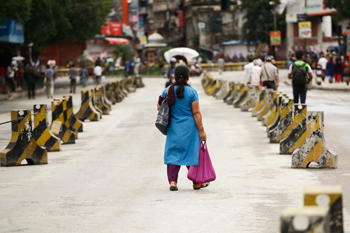
BIKRAM RAI
We planned to take the early morning bus from Nepalganj to Kathmandu after a family wedding. But the Tarai was shutdown by a banda called by Tharu activists.
Some bus drivers decided to risk driving at night so they could make their day wages. Like the bus drivers and conductors, some of us had jobs, others studies to return to. Within two hours, we had to stop in Lamahi of Dang behind a long line of trucks and buses on the highway that had been waiting for nightfall and APF escorts.
There were some 500 people sitting on the middle of Nepal’s main highway artery, drinking and celebrating a “successful banda”. The security forces were powerless to remove them. Finally at midnight, when the revelry ended, the convoys began moving again.
Even then, faceless people in the dark would throw stones at the vehicles. A bus to Kakadbhitta in front of ours was hit, its driver injured and windscreen shattered. As the bus careened through the night, I sat in the front of the bus shielding my young niece from more rocks. It took 19 hours for us to get to Kathmandu.
Back in Kathmandu earlier this week, my eight-year-old nephew saw his uniformed school mates going home, so returned saying there was a banda. It took me two hours to walk to a meeting, on the way there were many elderly and sick being helped along. At Baneswor intersection there was a small group of men with flags intimidating anyone who dared ride a motorcycle or car.
The 42 political parties don’t agree with the government, so they are punishing the people. Finally, there is hope that Nepal will get over its political deadlock, but the smaller parties have important criticisms of its timing and structure. What better way to assert yourself and be taken seriously than by enforcing a shutdown through street intimidation? By some counts, Nepal has been shut down for 380 days in the past five years.
Here is the contradiction. When elections happen in November, the same political parties will have to ask the same people who suffered from their enforced closures for votes. What will they say to them? Will they apologise to people who had to suffer from their violation of the citizen’s right to free movement and freedom from fear?
In a democracy, what should be paramount is the public interest. What kind of democracy is this where political parties compete with each other to terrorise and torture the very people who they want to vote for them? In 1990 and 2006, the art of hartal was honed as a fine form of political action. People joined protests spontaneously against perceived enemies of democracy. Who is the enemy now? A banda is no longer ‘called’ it is ‘forced’ upon people who want to have no part in it by politicians using street intimidation to make a point. For the organisers, the people are collateral damage, expendable ammunition for the cause. And the cause is usually nothing more than political upmanship: to get back at the other guys.
How many more times before November will the Nepali people have to be forcibly shackled for an exercise that is supposed to set them free?